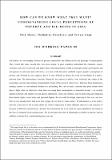| dc.contributor.author | Moore, Mick | |
| dc.contributor.author | Singh, Neelam | |
| dc.contributor.author | Choudhary, Madhulika | |
| dc.coverage.spatial | Asia | en_GB |
| dc.date.accessioned | 2014-01-23T16:17:19Z | |
| dc.date.available | 2014-01-23T16:17:19Z | |
| dc.date.issued | 1998 | |
| dc.identifier.citation | Moore, M. et al. (1998) How Can We Know What They Want? Understanding Local Perceptions and Ill-Being in Asia, IDS Working Paper 80, Brighton: IDS. | en_GB |
| dc.identifier.uri | https://opendocs.ids.ac.uk/opendocs/handle/20.500.12413/3398 | |
| dc.description.abstract | Aid donors are increasingly focused on poverty eradication and influenced by the principle of participation.
They would like more insight into how poor people in poor countries understand the character, causes,
correlates and cures of poverty and deprivation. Such information would in principle enable governments and
aid agencies to intervene more effectively. A review of the literature available on poor people’s perceptions of
poverty and ill-being in Asia suggests that it is very difficult to obtain this kind of knowledge in a policy-
relevant form. The information is heavily filtered by the context in which it was collected, the values of the
researchers, and the expectations of respondents. Some of the research ‘discoveries’ that have been promoted as
running counter to conventional wisdom are misleading. We can certainly conclude that poor Asians often
place a high value on objectives other than increasing their consumption or measured income – on security
against economic and natural risk and against oppression, crime and violence; and on protecting and enhancing
their human rights, social status and personal dignity. But it would be deeply surprising if this were not true.
Did we not already know that even poor people do not live by bread alone? If information is to be policy-
relevant, it has first to tell us more about the relative importance of these different objectives and concerns of
the poor in different circumstances. Second, the information has to be valid for large populations and robust in
the face of changing local circumstances. We do not have this kind of information available at present, and are
unlikely to obtain it by commissioning more surveys. | en_GB |
| dc.language.iso | en | en_GB |
| dc.publisher | IDS | en_GB |
| dc.relation.ispartofseries | IDS working papers;80 | |
| dc.rights.uri | http://www.ids.ac.uk/files/dmfile/IDSOpenDocsStandardTermsOfUse.pdf | en_GB |
| dc.subject | Participation | en_GB |
| dc.subject | Poverty | en_GB |
| dc.title | How Can We Know What They Want? Understanding Local Perceptions and Ill-Being in Asia | en_GB |
| dc.type | IDS Working Paper | en_GB |
| dc.rights.holder | Institute of Development Studies | en_GB |
| dc.identifier.koha | 113632 | |

